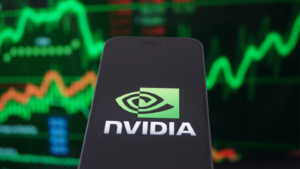
First, let’s acknowledge the elephant in the room.
Reasons remain unknown regarding the firing of OpenAI CEO Sam Altman. Altman’s dismissal sent shockwaves through the technology sector, rattling several stocks that are heavily exposed to AI.
However, OpenAI’s leadership change doesn’t diminish or affect the expected societal impact of AI and life-altering ways on our work and recreation. The market for AI is forecast to grow twentyfold by 2030 to $2 trillion in annual revenues.
And that’s just the beginning. From an investor standpoint, AI continues to present a huge opportunity. Read on to discover the AI stocks practically guaranteed to generate big gains in coming years.
Amazon (AMZN)

For a less obvious AI choice, consider e-commerce giant Amazon (NASDAQ:AMZN). While the company has lagged behind in the AI race, it is working overtime to catch-up.
First, recent news shows Amazon is spending tens of millions of dollars developing a new AI model code-named “Olympus.” In fact, the large language learning model reportedly has two trillion parameters. That’s double the power of OpenAI’s GPT-4 chatbot of one trillion parameters.
Specifically, large language learning models consume vast amounts of data to develop understanding and generate human-like responses to user prompts and questions. And, Amazon is hoping its AI project will eventually top the offerings of competitors such as Alphabet (NASDAQ:GOOG/NASDAQ:GOOGL) and Meta Platforms (NASDAQ:META). Additionally, Amazon is partnering with AI start-ups such as Anthropic and AI21 Labs, offering the technology to its cloud customers.
In their most recent earnings call, AMZN executives said the company is increasingly shifting investments towards AI while cutting back on its transportation and retail businesses. As a result, AMZN stock has gained nearly 70% this year.
Microsoft (MSFT)

True, Microsoft (NASDAQ:MSFT) remains out front in the AI race thanks to $10 billion invested in OpenAI. Truthfully, the strategic partnership of Microsoft and OpenAI is close and interconnected.
So, MSFT stock took a tumble upon news of the firing of OpenAI’s CEO Sam Altman. Indeed, Microsoft is adding generative AI to nearly all of its products. They range from its Bing search engine and Microsoft Word to its Xbox video games. Lately, word is coming that Microsoft is developing its own AI microchips in-house.
Specifically, Microsoft is creating AI chips to help power its cloud-computing technologies. The company announced its “Azure Maia AI Accelerator” chip. Specifically, the processor is designed to run generative AI technologies, including large language learning models used to train AI systems. Further, Microsoft executives say the new in-house AI chip is built on a five-nanometer process and has 105 billion transistors.
The AI chip will be rolled out in MSFT data centers in early 2024. Initially, the chip will be used to power the company’s Bing, Microsoft 365, and Azure OpenAI services. Then, it will be fully integrated with its cloud-computing systems. MSFT stock has risen 54% on the year.
Nvidia (NVDA)

No stock has benefitted more from AI thus far than chipmaker Nvidia (NASDAQ:NVDA). Currently, the company makes nearly 70% of the microchips that power AI applications worldwide.
The biggest complaint most companies have about Nvidia is that they can’t get their hands on the company’s chips fast enough. Therefore, huge demand and sales have powered NVDA stock to a 244% gain this year.
And, the company has unveiled a new chip called the “H200 Tensor Core GPU.” It is claimed to be 90% more powerful than its wildly popular H100 chip. Expect the chip to be available to customers all over the world in mid-2024.
Arguably the biggest concern with Nvidia (other than supply/demand) was the American export controls placed on the sale of its technologies to China. And, 25% of Nvidia’s sales come from Chinese companies. Regardless, NVDA is finding a way to succeed. The solution will see Nvidia sell three new microchips to Chinese manufacturers, ones with only 50% of the computing power of the company’s H100 chip. The lower power chips enable Nvidia to continue selling to China without violating U.S. laws.
On the date of publication, Joel Baglole held long positions in MSFT, NVDA and GOOGL . The opinions expressed in this article are those of the writer, subject to the InvestorPlace.com Publishing Guidelines.




